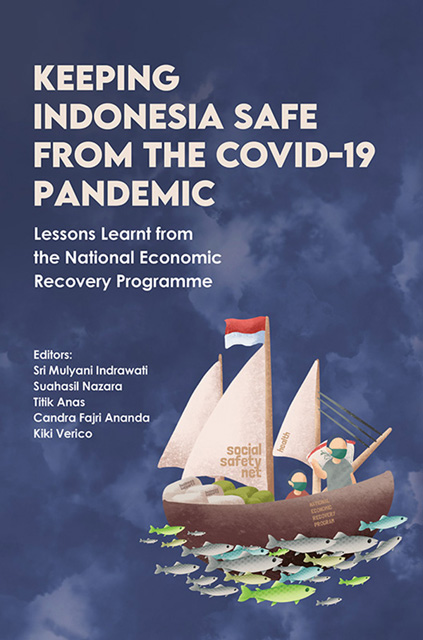 Keeping Indonesia Safe from the COVID-19 Pandemic
Keeping Indonesia Safe from the COVID-19 Pandemic Published online by Cambridge University Press: 30 June 2023
INTRODUCTION
Indonesia was on a growth trajectory between 2010 and 2019 with annual growth rates averaging 5.4 per cent and was hopeful of achieving the high-income country status by 2045. In 2019 Indonesia managed to show a healthy macroeconomic status—growth reached 5.02 per cent, the inflation rate was manageable at 2.78 per cent, the Gini ratio was at 0.39, the rupiah appreciated by 5 per cent, and there was a 138-basis point decrease in Indonesia's ten-year government bond yield in the second half of the year.
In 2020, the World Bank classified Indonesia as an upper-middleincome country. Later, due to the COVID-19 pandemic, Indonesia was then reclassified as a lower-middle-income country. The unprecedented Wuhan outbreak surprisingly shook the global economy to its core in a manner we had never seen before, except perhaps during the Spanish flu pandemic in the early 1900s. At about the time the first COVID-19 cases began to appear, the world was under a cloud due to the US-China trade war which had caused a long period of economic uncertainty and increased geopolitical tension resulting in surging commodity prices. In Q4 2019, the global economy looked set to rebound. Capital flows started returning to emerging markets assets, including Indonesia. The rupiah appreciated by 5 per cent between 31 May 2019 and 31 January 2020, and the ten-year yield went down by 138 basis points during the same period.
COVID-19 first emerged in late December 2019 in Wuhan, China (WHO 2020) and was thought to be a pneumonia disease. By mid-February 2020, positive cases had reached close to 50,000 and spread across twenty-seven countries. By this time, the global market was still in its bullish tendency, with capital flows still flowing into the emerging markets. However, the disease spread fast, pushing the World Health Organization (WHO) to announce a pandemic status on 11 March 2020. At that time, the financial market was still unaware of what was coming but there were already more than 118,000 COVID-19 cases in over 110 countries.
The global financial market was priced in less than ten days after the WHO declared the pandemic. On 20 March 2020, there was a freeze in the global financial market. The Volatility Index (VIX) hit an all-time high of 53.54.
To save this book to your Kindle, first ensure no-reply@cambridge.org is added to your Approved Personal Document E-mail List under your Personal Document Settings on the Manage Your Content and Devices page of your Amazon account. Then enter the ‘name’ part of your Kindle email address below. Find out more about saving to your Kindle.
Note you can select to save to either the @free.kindle.com or @kindle.com variations. ‘@free.kindle.com’ emails are free but can only be saved to your device when it is connected to wi-fi. ‘@kindle.com’ emails can be delivered even when you are not connected to wi-fi, but note that service fees apply.
Find out more about the Kindle Personal Document Service.
To save content items to your account, please confirm that you agree to abide by our usage policies. If this is the first time you use this feature, you will be asked to authorise Cambridge Core to connect with your account. Find out more about saving content to Dropbox.
To save content items to your account, please confirm that you agree to abide by our usage policies. If this is the first time you use this feature, you will be asked to authorise Cambridge Core to connect with your account. Find out more about saving content to Google Drive.